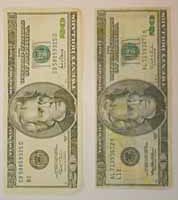| Law enforcement officials are investigating several suspected local consumer fraud cases. In addition, the authorities remain on the lookout for counterfeit currency circulating across Carbon County. The incidents represent a significant number of per capita cases in Price, points out Detective Scott Olsen. |
Local authorities are currently investigating a number of suspected consumer fraud incidents and law enforcement officials caution Carbon County residents to exercise caution to avoid falling victim to scams.
“Several different types of apparent scam activities are occurring locally,” indicated Price Police Detective Scott Olsen during an interview Tuesday.
Discussing the first type of suspected consumer fraud incident, the detective explained that the operators notify potential victims by telephone and tell the individuals they have won a “big chunk of money” in a Canadian lottery.
But in order to collect the prizes, the suspected criminal offenders indicate winners must send money directly to the lottery or transfer a designated amount of cash to a family member to prove they are taxpaying United States citizens.
“The operators are very specific on how people should transfer the money,” pointed out Olsen. “One Price resident transferred $1,900 and before the family could pick it up, the Canadian lottery got the money.”
The second type of suspected consumer fraud case reported to the Price City Police Department involves a similar tactic with a slightly different twist, continued Olsen.
Foreign lottery operators notify potential victims about winning cash prizes, but indicate an up-front fee is required before the money can be transferred to U.S. citizens.
After one local resident refused to pay a requested $300 fee, the lottery operator sent a check for a larger amount of money to the individual, pointed out Olsen.
The operator reportedly instructed the individual to deposit the check in a personal bank account and pay the $300 fee, then the money would be deducted from the cash prize.
Due to the international nature of the suspected criminal activities, the Federal Bureau of Investigation joined the local law enforcement effort. The FBI subsequently traced the origin of the check in question to a finance company in the eastern U.S.
The foreign lottery operators allegedly forged and mailed the check to the Price resident.
“We generally don’t have to deal with big city problems in Carbon County. The scams are playing on the naive state of the community. Trusting citizens tend to believe offers are legitimate, ” pointed out the detective.
In addition to the suspected lottery scams, local law enforcement authorities as well as FBI agents are investigating several local consumer complaints involving counterfeit U.S. currency and fraudulent Internet purchases, indicated Olsen.
“Counterfeit bills – mostly $20s – are floating around the county,” confirmed Olsen. “Some counterfeit $50s, $100s and single dollar bills are also circulating in the area.”
Verifying the validity of paper currency requires more than simply marking the bills with a counterfeit pen, stressed the police detective.
Olsen encouraged store clerks and private citizens in the Carbon County area to carefully examine currency before spending or accepting the denominations in question.
According to the Price police detective, the artwork and seals printed on valid U.S. currency have crisp, sharp edges.
Valid U.S. Treasury bills also contain water marks along with security strips and the federal government prints all legal currency on distinctively unique paper.
“Counterfeit bills look and feel differently,” noted Olsen.
Colors on counterfeit currency frequently bleed through, transfer and fade, added the police detective.
In addition to discolorations, the edges around U.S. Treasury seals and artwork on counterfeit bills appear blurry rather than crisp and clean.
Highlighting the Internet fraud investigations, Olsen indicated subjects from foreign countries apparently search the web for relatively inexpensive vehicles or motorcycles.
The so-called buyers contact advertisers and offer to send checks exceeding posted prices to cover not only the sales, but the costs of transporting the vehicles or motorcycles to the foreign country.
The Internet fraud suspects recommend that the sellers deposit the checks, then refund any overpayments to purchasing agents.
Consumers accepting the fraudulent deals andagreeing to reimburse the agents frequently discover the subjects paid for the transactions with bogus checks.
“Suspects are targeting $3,000 to $4,000 vehicles and sending bogus checks for about $9,000,” explained the police detective. “People may not realize it takes seven to 10 days for a check to clear and funds to be deposited in an account. By then, the victim’s money is gone.”
Price city and Carbon County residents should never pay unfamiliar promoters up-front fees in attempts to claim unverified prizes.
“If it doesn’t look right, it generally isn’t right,” emphasized Olsen.
Additional crime deterrent measures county and city consumers may practice include destroying all inactive bank or credit union account information, monitoring current check books and refusing to provide personal information to unsolicited telemarketers.
Olsen encouraged residents to report all suspicious telemarketing gimmicks, questionable Internet activities and suspected counterfeit currency to appropriate law enforcement agencies.
“Citizen involvement and the general public are our best resources,” concluded the police detective.

